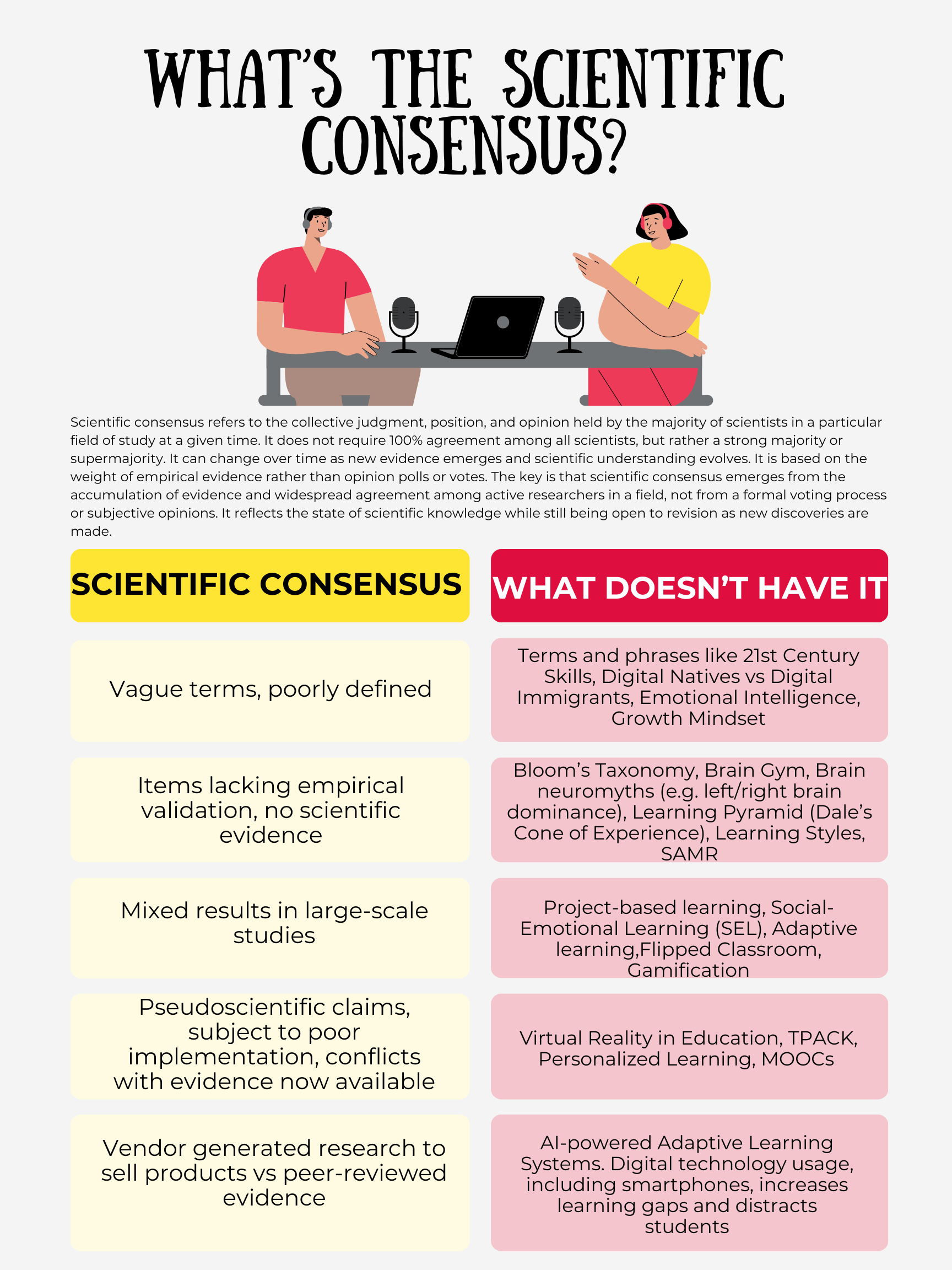What's the Scientific Consensus on That? #EduSky
One of my favorite takeaways from Melanie Trecek-King’s ThinkingisPower.com website? Exploring what the scientific consensus is for something. Whenever there’s an discussion about whether something is valid or not, whether it really helps or not, I find myself wondering, “What the scientific consensus on…[topic goes here]?”
Not surprisingly, while some of the times I’ve asked that, my guess has been right or in the ballpark, there have been several other times when I was wrong.
This discussion came up at work earlier this year, so I cooked up this chart with the help of AI. What do you think?

Scientific consensus refers to the collective judgment, position, and opinion held by the majority of scientists in a particular field of study at a given time. It does not require 100% agreement among all scientists, but rather a strong majority or supermajority. It can change over time as new evidence emerges and scientific understanding evolves. It is based on the weight of empirical evidence rather than opinion polls or votes. The key is that scientific consensus emerges from the accumulation of evidence and widespread agreement among active researchers in a field, not from a formal voting process or subjective opinions. It reflects the state of scientific knowledge while still being open to revision as new discoveries are made.
Stuff Lacking Scientific Consensus
Stuff Lacking Scientific Consensus
This table includes educational ideas and approaches that have gained popularity but lack strong scientific consensus. It’s important to note that some of these ideas, while not strongly supported by current evidence, may still offer valuable insights or practical applications in certain contexts. However, educators and policymakers should approach them critically and consider the available evidence when making decisions about implementation.
Sources of Educational Research
Make sure to research information at one of these sites before citing out-dated ideas, hypotheses, etc.
- Visible Learning MetaX database
- The IRIS Center
- What Works Clearinghouse
- Rand Corporation Research
- UNESCO 2023 GEM Report
- Definitions can be found online Visible Learning Meta X database
Instructional
Educational Technology
These concepts have gained attention in educational technology but still face various challenges in terms of scientific consensus, often due to implementation difficulties, mixed research results, or limited long-term studies on their effectiveness.
| Name of idea | Level of Scientific Consensus (Why it doesn’t have it) | Year proposed |
|---|---|---|
| Adaptive Learning | Moderate (Mixed results, implementation challenges) | 1950s |
| Connectivism | Low (Lack of empirical evidence, criticized as a learning theory) | 2005 |
| Digital Badges | Low (Limited research on long-term impact and motivation) | 2010s |
| Flipped Classroom | Moderate (Mixed results, implementation challenges) | 2000s |
| Gamification | Moderate (Mixed results, concerns about long-term effectiveness) | 2000s |
| Learning Analytics | Moderate (Privacy concerns, implementation challenges) | 2010s |
| MOOC (Massive Open Online Courses) | Low (High dropout rates, limited evidence of effectiveness) | 2008 |
| Personalized Learning | Moderate (Implementation challenges, definition issues) | 1960s |
| SAMR Model | Low (Lacks empirical research, oversimplifies technology integration) | 2006 |
| TPACK (Technological Pedagogical Content Knowledge) | Moderate (Measurement issues, implementation challenges) | 2006 |
| Virtual Reality in Education | Low (Limited long-term studies, cost and implementation issues) | 1990s |